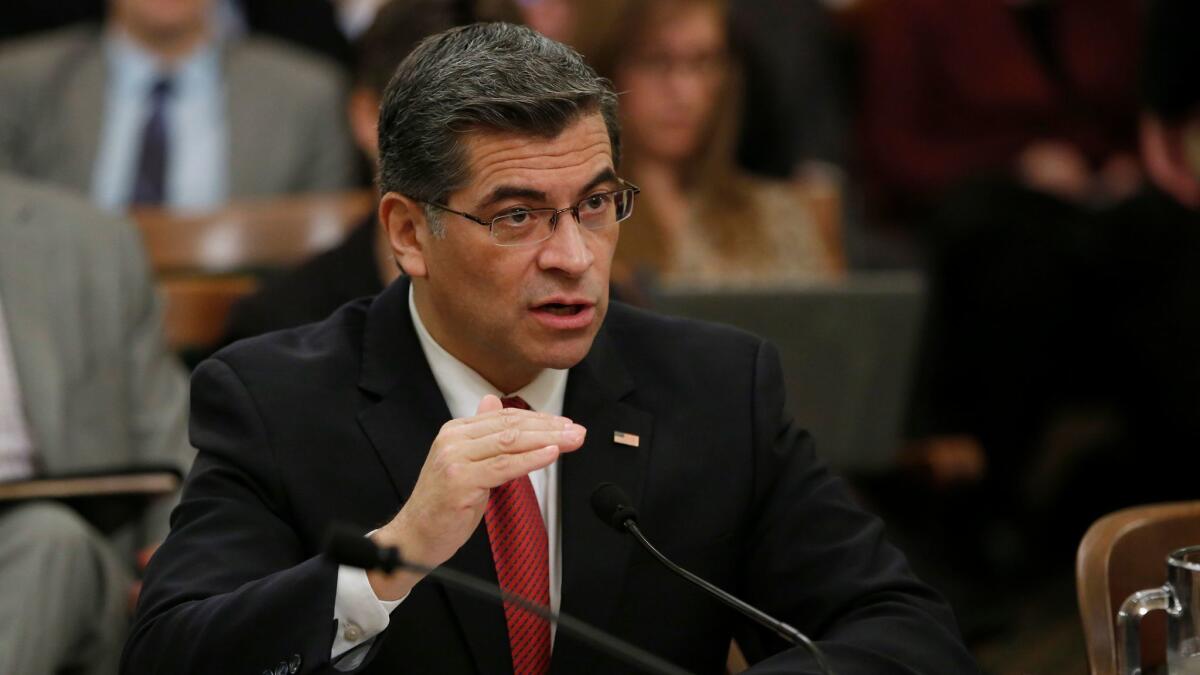Three drugmakers settle with California over deals to keep generic medications off the market

- Share via
Two pharmaceutical companies will pay the state of California a total of nearly $70 million to settle allegations that they violated antitrust laws by making agreements to delay generic drugs from entering the market, according to the California attorney general’s office.
A third company will be subject to an injunction as part of the settlement.
Teva Pharmaceuticals Industries Ltd. illegally maintained a monopoly over sales of narcolepsy drug Provigil by entering “pay-for-delay” agreements to keep a generic version off the market for almost six years, Atty. Gen. Xavier Becerra’s office said in a statement Monday.
Pay-for-delay agreements — under which the maker of a brand-name drug pays other drugmakers to refrain from producing a generic version after the drug’s patent expires — are not on their face illegal, but they can be used in ways that violate antitrust law. Regulators have said such deals also keep drug prices high.
“When competitors shake hands and agree to keep the cheaper product off the market, it’s bad for consumers,” said Robin Feldman, distinguished professor of law at UC Hastings College of the Law in San Francisco.
California has been at the forefront of legal actions related to pay-for-delay agreements, in part because the state’s antitrust law can be broader than federal law, she said.
It’s bad enough drug companies charge sky-high prices for brand-name prescription meds and raise those prices with regular frequency.
As part of the settlement announced Monday, Teva will pay the state $69 million, Becerra’s office said. About $25 million of that is to be used to create a fund for California residents who bought Provigil or related medications Nuvigil or Modafinil from 2006 to 2012.
The Israeli pharmaceutical firm will also be under an injunction preventing it from entering into pay-for-delay agreements for 10 years.
Teva said the $69 million will come out of a settlement fund that was established after it settled a 2015 Federal Trade Commission lawsuit for $1.2 billion.
In the settlement agreement announced Monday, Teva denied all of the state’s claims of unlawful conduct and said the agreement was not an admission of liability.
Teva, Endo Pharmaceuticals and Teikoku Pharma also made pay-for-delay agreements about Lidoderm, a medical patch to treat pain from shingles, Becerra’s office said. It said the agreements kept a generic version off the market for almost two years. Endo and Teikoku were partners in producing Lidoderm, and a company later acquired by Teva agreed to delay releasing a generic version of the medication.
Under a settlement reached last month, Endo will pay the state $760,000 and will be under an eight-year injunction preventing it from entering into further pay-for-delay agreements, Becerra’s office said. It said Teikoku will be under a 20-year injunction.
Teva said it would pay the state $200,000 for its legal fees as part of this settlement. Endo and Teikoku did not immediately respond to requests for comment.
In 2013, the U.S. Supreme Court ruled that a brand-name drug manufacturer could be sued for violating antitrust laws if it engaged in pay-for-delay agreements, but that regulators could pursue such cases only on a case-by-case basis. At the time, the FTC said such agreements cost consumers and health plans $3.5 billion annually.
On average, brand-name drugs affected by pay-for-delay deals cost 10 times more than generic versions, according to a 2013 report from consumer advocacy groups CalPIRG and Community Catalyst that analyzed information about 20 medications. Brand-name drugmakers made an estimated $98 billion in total sales of those drugs while generic versions were delayed, the report said.
“It hurts consumers because it keeps generic drugs off the market longer than they should be,” said Michael Carrier, distinguished professor at Rutgers Law School. “When a generic enters the market, price falls dramatically, and that can mean the difference between someone taking their medication and someone not taking their medication.”
Becerra called pay-for-delay agreements “dark” and “collusive.”
“We’ve seen the way prices have been jacked up in ways that are incomprehensible,” he told reporters Monday. By delaying the market entry of generic drugs, he said, such a deal “continues the ability of that brand-name company to market exclusively that drug at higher prices.”
Becerra is backing a state bill that would make such agreements illegal in California. The bill — AB 824 by Assemblyman Jim Wood (D-Healdsburg) — has passed the state Assembly and proceeded to the state Senate. It would prohibit deals among drug companies involving “anything of value” changing hands to delay introduction of a generic alternative to a brand-name medicine.
More to Read
Inside the business of entertainment
The Wide Shot brings you news, analysis and insights on everything from streaming wars to production — and what it all means for the future.
You may occasionally receive promotional content from the Los Angeles Times.











